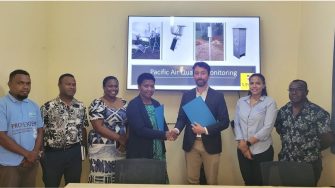UNSW Pasifika air quality research project expands to include Tonga and Vanuatu
Project will increase data and information for local decision-makers facing public health concerns
Project will increase data and information for local decision-makers facing public health concerns

The ambient air quality of Pacific Island Countries has been deteriorating in recent years with increasing incidences of human respiratory illness observed in national health data. Data collected by UNSW researchers since 2018 in urban and peri-urban areas of Honiara, Solomon Islands and Suva, Fiji, have shown concentrations exceeding the 2021 WHO guideline for PM2.5 which is of public health concern.
Field equipment supporting a consortia research project, “Pasifika Air Quality and Environmental Health” has been installed in partnership with pacific and international partners. The field research program, led by UNSW Humanitarian Engineering Academic Lead Dr Andrew Dansie with researchers Jimmy J Hilly and Khadija Al Nabhani, aims to understand the role of local and transboundary sources of airborne particulates.
The project is being undertaken as part of a collaborative research partnership to provide continuous air quality monitoring and sampling in the Pacific with results that allow comparison of air quality and health impacts between urban, peri-urban and rural environments and between countries.
Air quality monitoring equipment installed at USP Tonga campus November 2022
In 2022 Tongan government ministries and the University of the South Pacific’s (USP) Tonga Campus agreed to collaborate on the project. The expansion of the research project to include Tonga was welcomed by UNSW and by USP Tonga Campus Director Dr Robin Havea. Air quality monitoring and sampling equipment was installed on USP Tonga campus in late 2022.
Dansie, a specialist in wind-borne particle erosion and the biogeochemistry of dust and water management, says the project will increase data and information for in-country led research and policy development priorities, and aims to support in-country efforts to measure air quality through direct sampling and monitoring of aerosols.
Working with Dansie on the Pasifika project at UNSW are Jimmy J Hilly, Senior Environmental Health Officer, Solomon Islands Ministry of Health and Medical Services, who is undertaking a PhD at UNSW Civil & Environmental Engineering (CVEN) on the topic of ‘Airborne Particulates And Lower Respiratory Illness In The Pacific,’ and CVEN research assistant Khadija Al Nabhani whose PhD topic is ‘Transport Pathways of Microplastics in the South Pacific.’ Khadija has recently published findings on ocean-transported microplastic pollution on Fijian beaches.
In a further exciting expansion of the project, in January 2023 UNSW signed a Memorandum of Understanding (MOU) with the Government of the Republic of Vanuatu, Ministry of Climate Change Adaptation, Meteorology, Geohazards, Environment and Energy; to strengthen the collaboration on air quality monitoring in Vanuatu.
Two air quality monitoring stations have now been installed in Port Vila, Vanuatu. The stations are located at the Ministry of Climate Change Adaptation, Meteorology, Geo-Hazards, Environment, Energy and Disaster Management meteorology station and the Bauerfield airfield meteorology station. Sincere thanks to the Director for the Department of Environmental Protection and Conservation Ms Jane Tiwok and her team Ms Ionie Bolenga and Ms. Annabelle Alilee for making this possible. Tangkiu team Vanuatu!
To date the project now has air quality monitoring stations in Suva, Fiji, Honiara, Solomon Islands, Nuku'alofa, Tonga and Port Vila, Vanuatu as part of a broader Pacific Air Quality Monitoring network. Project partners include UNSW, The University of Queensland, QUT (Queensland University of Technology), Fiji National University, The University of the South Pacific, ESR – Science and Research, University of Sydney, Gwangju Institute of Science and Technology (Korea), University of Oxford, and the Governments of Fiji, Solomon Islands, Tonga and Vanuatu.
Photo: UNSW HDR Jimmy Hilly performing midnight sampling change over for PM2.5, rural Fiji
The partners supporting UNSW’s field instrumentation are:
Fiji:
Solomon Islands:
Vanuatu:
Tonga:
For further information on the project and the air quality monitoring and sampling capabilities of UNSW please go to https://www.airquality.unsw.edu.au
L-R: USP Tonga Campus Director Dr Robin Havea, with UNSW researchers Jimmy Hilly, Dr Andrew Dansie & Khadija Al Nabhani. For more on the USP Tonga agreement see USP article here.